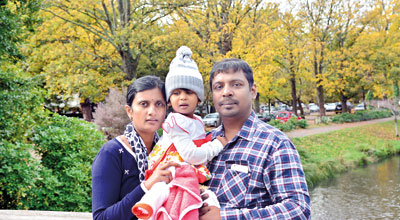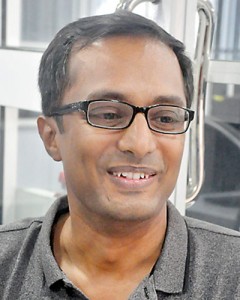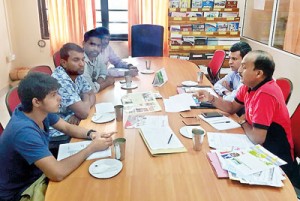News
From Jaffna to the world and back again
As a boy, Ayingaran Thevathasan helped his parents earn a living by distributing milk from a cow they bought with a bank loan. Later, when they acquired some chickens, he also delivered eggs to the shops: twice a day, before and after school.

Ayingaran Thevathasan with his family
Before the cow and chickens, they lived on wartime rations distributed by the Government to conflict-affected families in the North and East. Ayingaran’s father, Kala Vibhushana Moothathamby Thevathasan, was an artiste in Jaffna who did dramas and temple paintings. Work dried up amidst fighting and displacement. His mother was a housewife.
The family fled from Karainagar to Manipay in the Jaffna district in 1990-91. They left with nothing. In Manipay, they rented space in a house occupied by an elderly lady. Her relatives, who owned the property, waived off payment after seeing their financial situation. They lived there as caretakers after her death.
Money was sparse but education and uniforms were free. That was what mattered to Ayingaran. He won a scholarship to study at Jaffna Hindu College. “I was lucky,” the 36-year-old said from Singapore, where he has worked as a civil engineer for the past ten years. “We got free education so it did not disturb my studies. I didn’t take private tuition. I worked hard in school. Our financial situation did not affect my learning. Our challenge was buying clothes and food.”
Ayingaran scored seven distinctions and a credit at the O/Levels. He was consistently among the top five performers in class. He passed his A/Levels in maths with three As and one C, gaining entrance to the University of Moratuwa. But during a visit to the University of Peradeniya – where most of his friends were due to enroll – he fell in love with the environment and secured a mutual transfer.
With his second upper degree, Ayingaran worked briefly at a design firm in Borella. But he struggled to repay a loan he took for his mother’s kneecap operation. And they still had no house. Reluctantly, as he was the only child of ailing parents, he took a job in Singapore. Now married with a four-year-old daughter, he has been with the same company since 2007.
In 2016, he was added to a WhatsApp group called ‘E00 Tamils’ comprising around 60 percent of the Tamil engineers who graduated from Peradeniya University who graduated with him. ‘E00’ was the name of that batch (it had around 100 Tamils in total, all engineers). Many of them are now domiciled abroad.
After some initial- often heated – discussions about politics, another mechanical engineer named S. Mathavan suggested that the group put money and expertise where their mouths are and do something to assist the war-torn North and East.
The 37-year-old Mathavan lives and works in Holland and was also affected by the conflict. The Jaffna Central College student shifted several times owing to his father’s work and the fighting. In 1996, they joined the exodus to Vadamarachchi. They spent one-and-a-half-years in India when the Indian Peace Keeping Force was in the North. “We are,” he concluded, “the children of war.”
Mathavan’s father is also a mechanical engineer who worked in the North for 30 years. There were quite a few years, he said, when he and his younger sister and brother went without schooling. This did not trouble his socialist father much. He was not a proponent of the formal education system with its tuition and over-coaching.
He preferred self-instruction.

Shivasankar
“My father had a reasonably-sized company of around 30-40 people but he didn’t believe in accumulating wealth,” Mathavan explained. “We grew up with that ideology.
His workshop was near our home and I was exposed to a lot of his projects from a young age; machinery being made locally such as oil presses for the coconut industry or equipment for the palmyra industry.”
After graduating from Peradeniya, he worked there for one-and-a-half years before reading for a PhD in England and moving to Holland. It was he and another England-based batch-mate named Nithiy Myuran who floated the idea of a “technology charity” that could make a difference in the North and East. Whilst most people put in money, this group felt they could go further by contributing expertise.
Tech Ceylon Social Ventures (Gte) was registered in Sri Lanka one year ago as a non-profit company. It now has around 25 active members. “The idea is to give technology support to the North and East because we feel that after the end of the war there are funds going into the region but nothing has happened,” said Mathavan.
“People get money and spend money. But there is no innovation or development.”
They wanted to do something sustainable. Initially, they funded an incense stick production facility for a Christian organisation working with the disabled in Mannar. It was then proposed to the company that they help the cooperatives sector which was once thriving in the North and East but which took a hit during the war.
They held discussions with some of the better-run cooperatives such as the Pandateruppu Multi-Purpose Cooperative Store (MPCS). With 3,000 active members, it still runs a rice mill, grinding mill, bank, petrol shed, bakery, gingelly oil press, co-op city and textile shop among others.

Brain storming session between Tech Ceylon volunteers and authorities
The Jaffna Government Agent had a budget for cooperatives. So Tech Ceylon assisted these bodies with something they are now ill-equipped to do: drawing up detailed project proposals. “We want to start with technical matters such as proposal-writing, getting funding, budget allocation and bringing in the right technology,” said Sivayoganathan Sivasankar, a Colombo-based engineer in the telecommunications sector. “Then we will move into supporting implementation.”
Work completed thus far includes a project proposal for the modernisation of and expansion of the rice mill and bakery of the Pandateruppu MPCS; a project proposal for the modernisation and capacity increase of a rice mill for the Udupiddy MPCS; a process upgrade of the fruit-based food and beverages factory of the Chunnakam MPCS; a proposal for the expansion of the food packing centre of the Neerveli MPCS; and suggestions to expand and computerise co-operative rural banks and thrift and credit societies. They also contributed proposals to the Finance Ministry for the 2018 budget.
All this was done between July and November 2017. Every bit of it was voluntary. With time, the group wants to fill the vacuum in the engineering sector and create more and more opportunities in the field. Engineers, which the North and East produce in plenty, either seek employment in the South or migrate. This is because there is no longer any modernisation in their home towns which have become, as one of them termed it, “wastelands in terms of innovation”.

Mathavan
Ayingaran has gone a step further. In 2014, he set up a firm in Jaffna called Unistruct Consulting Engineers (Pvt) Ltd to create jobs for the region’s engineers. He wanted to stop the brain drain. Among his 20-strong staff are 12 engineers and 7 draftsmen. All were fresh graduates when recruited. The company does structural and architectural design for Singaporean clients, bringing in around Rs 2.5mn a month into the country.
“I benefited from our country’s free education,” Ayingaran said. “I thought I must do something back. I came abroad to earn a living. But if I make a comfortable life for people in Jaffna, they will stay and work. It also helps us to participate in Sri Lanka’s development.”
The engineers in the group are scattered around the world. “A lot of educated people from our country are serving other countries,” Ayingaran said. “Most of them hold high positions because of the knowledge they have gained. Our country needs overseas support in technology.”
Living abroad, he explained, they see how developed nations used technology, organised themselves and managed problems. “We have the experience,” he said. “We are trying to bring that to our own homes, trying to implement suitable models and introduce solutions to problems our country is facing that are already available in other places.”

